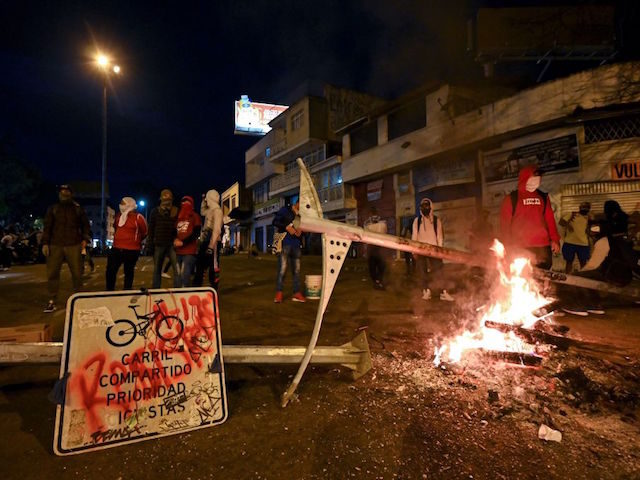Multiple reports Tuesday morning out of Cali, Colombia, painted violent scenes of rioters burning down buildings, including a prominent hotel, and confronting armed civilians protecting their property as nationwide riots near one week of public terror.
Colombians began organizing protests last week against President Iván Duque, a self-proclaimed conservative, proposing a significant tax increase meant to offset losses caused by the Chinese coronavirus pandemic and related economic strife. The proposal prompted criticism from both right and left, including the head of Duque’s political party, former President Álvaro Uribe. Colombia has one of the world’s highest coronavirus infection rates, documenting nearly 3 million cases and over 75,000 deaths attributable to the pandemic as of Tuesday.
Duque announced Sunday that he would no longer pursue a tax increase through Congress and instead seek “consensus” in a financial package that would address the government’s pandemic woes without placing an undue burden on civilians. Duque walking back the widely panned reforms he had initially introduced did not quell the violence, however, which surged Saturday, the Marxist holiday known as “International Workers’ Day.”
Since the initial protests, unions and other left-wing groups have organized mass events that have yielded to riots nationwide. According to the New York Times, the riots have resulted in at least 19 deaths, including those of teens in the vicinity of protests, and hundreds of injuries. Protesters have complained of excessive police violence against them; authorities stated they have launched investigations into each individual incident to determine the causes of their deaths.
Duque issued a stern statement against street violence on Sunday, prior to the Cali riots.
“One this is peaceful citizens’ expression that, in a democracy, should be protected, and another thing is cases of criminal vandalism,” Duque asserted. The president also accused rioters of creating roadblocks “with the clear intention of hurting others” and to create shortages in cities during a pandemic both of food and other basic goods and things like oxygen, which are pivotal for treating hospitalized coronavirus patients.
Colombia’s RCN news network reported on Tuesday that Cali, a resort city close to the nation’s west coast, experienced especially violent incidents overnight on Monday that prompted locals to patrol streets with their personal firearms.
“While, in some sectors, vandals attacks public forces [police] stations and private estates — according to videos distributed by citizens — police have also engaged in actions that some have qualified as abuses of authority,” RCN noted.
RCN described as “evidence of the chaos that the [regional] capital is experiencing” the fact that “some citizens took justice in their own hands … taking the streets to confront hooded attacks who attempted to expand violence in the area.” Local civilian residents “went out to repel vandalism attacks, doing so also carrying weapons, amplifying tensions,” the network observed.
El Tiempo, one of Colombia’s largest national newspapers, reported the alleged vigilante groups began roving neighborhoods around 9 p.m., after rioters began to burn the city’s Hotel La Luna. The hotel reportedly survived the fire but sustained significant damage. Rioters also began attempting to burn down a local bank and creating road blockades, which attracted the attention of armed residents who confronted them to reopen the roads.
“Videos show neighbors confronting protesters and asking them to unblock the road. Citizens inform that, in addition, armed people were present,” El Tiempo relayed.
Given the inherent confusion of a riot situation, online reports also indicated that some of the armed civilians began attacking police, suggesting that some armed individuals were part of the anti-police movement, not responding to riots. Reports identified these individuals as “armed civilians” without elaborating.
Uribe, the former president, shared a video on Tuesday of unknown sourcing allegedly showing armed individuals attacking police in Cali.
The mayor of Cali, Jorge Iván Ospina, said Tuesday that he had reached out to both Uribe and the country’s most prominent leftist, socialist Senator Gustavo Petro, urging help to calm the violence.
“In the early morning hours I called former President Álvaro Uribe and I called Gustavo Petro, and I discussed the responsibility we all have to ensure this city does not become a scene of violence and war,” Ospina told reporters. I have called on all, including them, to pick up and find the appropriate exit [to the situation].”
As of Tuesday, leftist groups continue to call for street protests nationwide without end, now to protest the alleged police brutality. Petro took a different approach in remarks on Tuesday, declaring, “it’s time for a hug.”
Petro lost decisively against Duque in the 2018 presidential election, but is considered a frontrunner in 2022.
Colombia most recently experienced left-wing riots last year — alongside neighbors Chile and Ecuador — that also appeared triggered by unpopular proposals that led to claims of police brutality. In Chile, protesters first took the streets against a proposed increase in subway fares in the capital, Santiago, but leftists rapidly escalated to burning down churches and other religious sites. Former Ecuadorian President Lenín Moreno proposed an end to socialist gasoline subsidies that similarly triggered protests that erupted into violence and continued despite him retracting his proposal and keeping the subsidies.

COMMENTS
Please let us know if you're having issues with commenting.